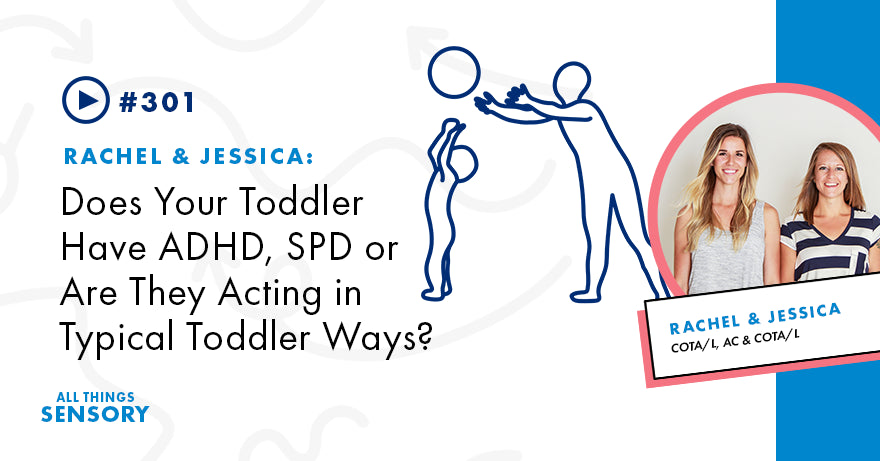Your Cart is Empty

Check out our newly re-launched digital course: Early Intervention Blueprint: Sensory and Developmental Milestones for Infants and Toddlers
Designed for new and expecting parents, as well as therapists and professionals working with children ages birth - 4 years. OTs and OTAs - earn 11 CEU contact hours through AOTA with this digital course!
As pediatric therapists, we’re often asked about certain toddler behaviors - Is this ‘normal’? Should I be concerned about _____? Does my toddler have ADHD?
Today, we’re chatting about what is considered ‘normal’ in toddlerhood - what you can expect from your toddler and what are some signs that there might be some underlying challenges.
First, we dive into common things that toddlers go through, like struggling with a new event and pushing back during daily routines.
Then we dive into what it looks like for a toddler to have specific sensory processing challenges and what we might see if a toddler is showing signs of ADHD.
And finally we finish the conversation with what you can do!
Make sure to check out all of our links below!
We’d love to answer your questions on the podcast! Fill out this form -> https://harkla.typeform.com/to/ItWxQNP3
All Things Sensory Podcast Instagram
Harkla Website - Shop Sensory Products!
Overview of Attention Deficit Hyperactivity Disorder in Young Children
Overview of Developmental Milestones
FREE Sensory Preferences Checklist for Infants and Toddlers
As parents, encountering unexpected behaviors in our children can often feel overwhelming, prompting concern and speculation about potential underlying issues. In recent years, the spotlight on developmental disorders, including Attention Deficit Hyperactivity Disorder (ADHD) and Sensory Processing Disorder (SPD), has grown brighter, heightening our vigilance.
Yet, distinguishing between the quirks of typical toddler behavior and indicators of a more profound concern remains challenging. How do we discern whether our child's actions are part of growing up or signify something more significant?
ADHD, a neurodevelopmental disorder, impacts millions of children worldwide and often continues into adulthood. Although such behaviors are common in young children, those diagnosed with ADHD exhibit them to an extent that markedly disrupts their day-to-day activities.
A child with ADHD may experience challenges with:
Sensory Processing Disorder (SPD) is a multifaceted condition that influences how individuals perceive and react to sensory stimuli, the signals our brains obtain from our senses. Children with SPD may face difficulties, including:
ADHD and SPD are genuine conditions that can significantly impact a child's life. However, it's essential to recognize that many behaviors toddlers display are typical.
Common behaviors in young children encompass:
It's vital to remember that each child grows at their rate and may display specific behaviors more often than their peers. Additionally, it's important to consider the context of these behaviors since situational factors significantly influence a child's reactions.
There are specific indicators that suggest your child may require additional evaluation or support:
The Diagnostic and Statistical Manual of Mental Disorders, Fifth Edition (DSM-5), is the primary tool for medical professionals to diagnose ADHD. To confirm an ADHD diagnosis, six symptoms listed in the DSM-5 criteria must be identified in each of the two main categories: predominantly inattentive and predominantly hyperactive-impulsive.
Should you have concerns regarding your child's behavior, it's crucial to consult a reputable medical professional. They possess the expertise to assess your child and offer advice on subsequent actions, such as therapy or behavioral strategies.
Additionally, you can support your child at home by:
It's crucial to align your expectations for your child with established developmental milestones. Recognizing the distinction between typical toddler behaviors and those necessitating extra support is vital for effectively advocating for your child's needs.
By nurturing your child with patience, empathy, and unwavering support, you lay the groundwork for a positive and nurturing environment that caters to their unique needs. This approach equips them with the essential skills and confidence required for a prosperous future.
BORING, BUT NECESSARY LEGAL DISCLAIMERS
While we make every effort to share correct information, we are still learning. We will double check all of our facts but realize that medicine is a constantly changing science and art. One doctor / therapist may have a different way of doing things from another. We are simply presenting our views and opinions on how to address common sensory challenges, health related difficulties and what we have found to be beneficial that will be as evidenced based as possible. By listening to this podcast, you agree not to use this podcast as medical advice to treat any medical condition in either yourself or your children. Consult your child’s pediatrician/ therapist for any medical issues that he or she may be having. This entire disclaimer also applies to any guests or contributors to the podcast. Under no circumstances shall Rachel Harrington, Harkla, Jessica Hill, or any guests or contributors to the podcast, as well as any employees, associates, or affiliates of Harkla, be responsible for damages arising from use of the podcast.
Keep in mind that we may receive commissions when you click our links and make purchases. However, this does not impact our reviews and comparisons. We try our best to keep things fair and balanced, in order to help you make the best choice for you.
This podcast should not be used in any legal capacity whatsoever, including but not limited to establishing “standard of care” in a legal sense or as a basis for expert witness testimony. No guarantee is given regarding the accuracy of any statements or opinions made on the podcast.
Comments will be approved before showing up.